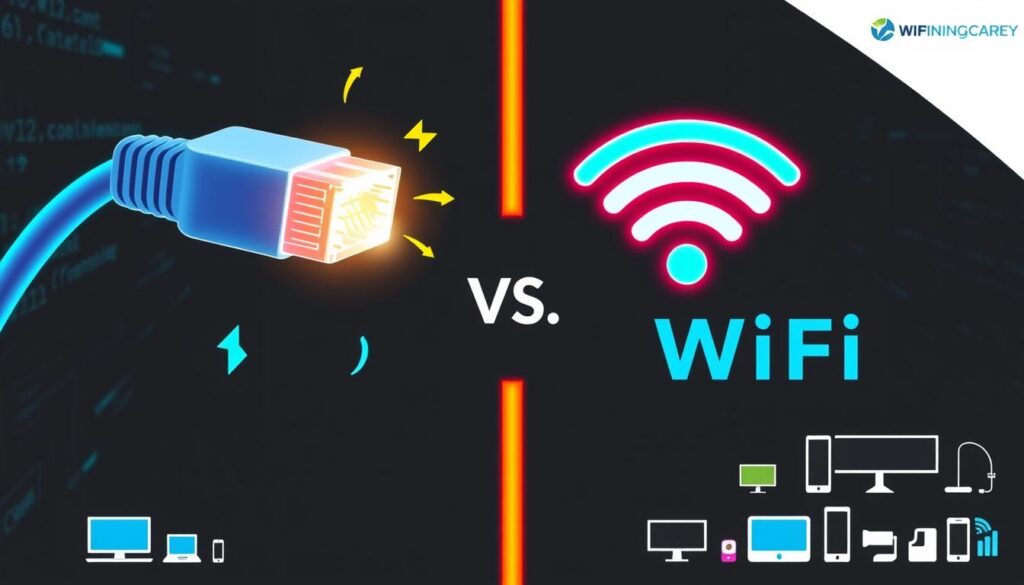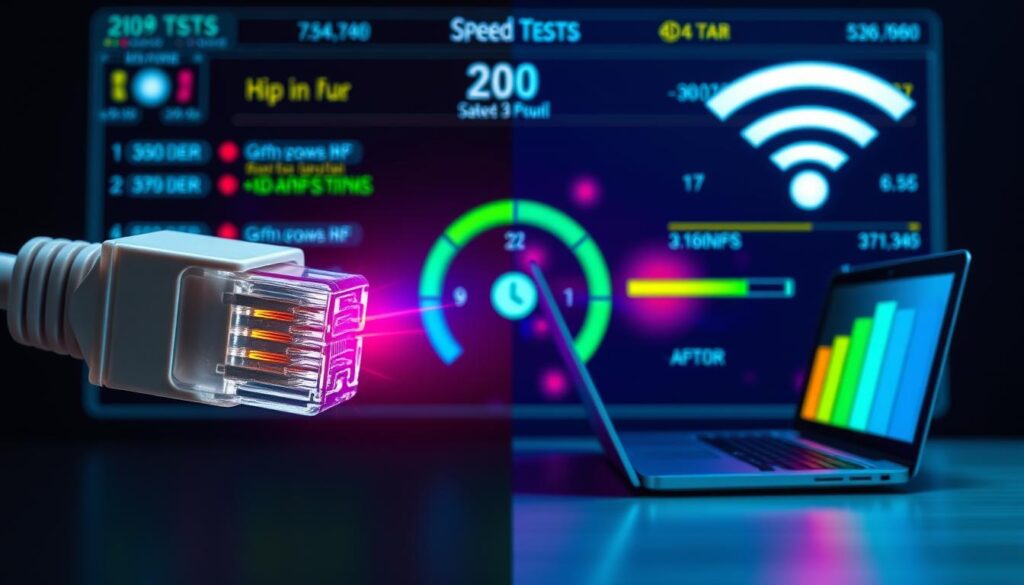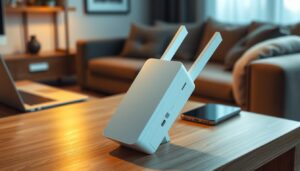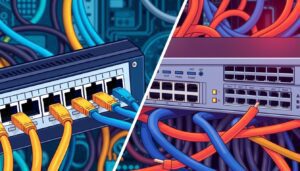Is Ethernet cable faster than WiFi? The debate between Ethernet cables and WiFi is common. Although both provide internet connectivity, one may be superior to the other. A decent internet experience depends on knowing whether Ethernet is faster than WiFi.
In the modern world, prompt and trustworthy internet is necessary. Recognizing Ethernet and WiFi speeds is important, particularly as online gaming, streaming, and remote work increase in popularity. This information lets you select the top internet provider for your needs.
To get the most from your internet, consider important factors. These include the connection type, network congestion, and device capabilities. All these impact how fast your internet is.
Important Lessons
- Your experience using the internet is dependent upon your capacity to Identify differences between Ethernet and WiFi speeds.
- Ethernet vs wifi speed and ethernet vs wifi performance are significant elements for connecting to the internet.
- Internet speed is impacted by the device’s capacities, network gridlock, and connection type.
- Understanding whether is ethernet cable faster than wifi can assist you in choosing your internet connection wisely.
- Ethernet vs wifi performance is essential for distant work, gaming, and streaming internet.
- Taking into ethernet vs wifi speed can assist you in selecting the ideal internet connection for your need.
Understanding the Speed Battle: Ethernet vs WiFi
The speed difference between Ethernet and WiFi is still up for dispute. We must consider a number of important aspects to determine which is faster. These include the device’s capabilities, network congestion, connection type, and internet service provider quality.
Because Ethernet uses actual wires, its speeds are more consistent and faster. On the other hand, wifi uses wireless signals. These can be slowed down by interference and network congestion. This difference greatly affects how well ethernet and wifi perform.
What Defines Internet Speed?
Internet speed is how fast data moves between devices. Several things can change this rate. These include the connection type and the internet service provider’s quality. To select the best option for you, it’s critical to consider these considerations when comparing wifi and Ethernet.
Key Factors in Connection Speed
Several factors can affect connection speed. These include:
- Network congestion
- Device capabilities
- Internet service provider quality
- Type of connection (ethernet or wifi)
Basic Speed Differences Explained
Compared to wifi, Ethernet connections are usually faster and more trustworthy. This is so because Ethernet depends on cables, which are less vulnerable to jams and interference. Consider the advantages and drawbacks of both wifi and Ethernet before selecting one. Pick the one that most appropriate your requirements.
Is Ethernet Cable Faster Than WiFi? The Truth About Connection Speeds
A common factor in choosing between Ethernet and WiFi is speed. Which is faster, wifi or Ethernet, depends on several variables. Ethernet cables have a 10 Gbps maximum speed. Conversely, WiFi typically reaches its maximum speed of 1 Gbps.
A wifi vs ethernet speed comparison demonstrates that Ethernet is more dependable and faster. WiFi, however, is more adaptable and convenient. The reason for this is that Ethernet cables link straight to the internet. Congestion and interference can slow down WiFi connections.
When looking at internet speed, consider these factors:
- Internet service provider (ISP) quality
- Network congestion
- Device capabilities
Experts say the speed difference between Ethernet and WiFi depends on these factors. It also depends on your network’s setup and configuration. To get the best internet, understand the pros and cons of each and choose wisely.

In conclusion, Ethernet might be faster than WiFi in many cases. However, your decision is based on your likes and needs. You may choose the finest choice for a dependable, fast internet connection by taking the variables into account and balancing the advantages and disadvantages.
How Ethernet and WiFi Actually Work
Choosing between ethernet and wifi depends on knowing how they work. Ethernet uses cables for a stable connection. WiFi, on the other hand, uses radio waves for flexibility and convenience.
Ethernet is usually faster because it’s a physical connection. But, the latest WiFi standards can match ethernet speeds. Let’s explore the science behind each.
The Science Behind Ethernet Connections
Ethernet uses cables to send data. This method is stable and reliable. It’s great for high-speed needs.
WiFi Technology Explained
WiFi sends data through radio waves. It uses routers and network cards for data transfer. WiFi is flexible but can be slow due to interference.
Signal Interference and Its Impact
Interference can slow down WiFi. It can come from other devices, walls, or nearby networks. Knowing this helps choose between ethernet and WiFi.
Understanding ethernet and WiFi differences helps you decide. Whether you need speed, reliability, or convenience, knowing how they work is crucial.
Real-World Speed Test Results and Performance Data
Is Ethernet cable faster than WiFi? In the process of comparing ethernet cable vs wifi speed test, ethernet is clearly superior. It is more dependable and speedier than wifi. This is because Ethernet reduces interference and missed packets by using a physical wire. However, obstructions, distance, and other equipment can slow down wifi transmissions.
Observing ethernet vs wifi internet speed, Ethernet has a 10 Gbps maximum speed. But, wifi usually has a top speed of 1 Gbps. Still, many people choose wifi because of its flexibility and simplicity of use. Choosing the best answer for you requires thoughtful evaluation of your requirements.

Take into account a few factors while examining the results of ethernet cable vs. wifi speed tests:
- How far you are from the router
- The number of devices connected
- The type of activities you’re doing (like streaming or gaming)
Knowing these factors helps you choose the right connection for your needs. You stand to gain from the fastest internet speed reachable in this way.
In which situations is Ethernet preferable than WiFi, and vice versa?
Your requirements for the internet will be ascertained regardless of whether you choose Ethernet or WiFi. The query of is ethernet cable faster than wifi It depends on the circumstances. Ethernet usually wins for reliable, fast speeds, perfect for tasks needing low latency and high bandwidth.
For gaming and streaming, Ethernet is the top pick. It gives a stable connection, cutting down on lag and buffering. Home offices also benefit from Ethernet for its secure, reliable link.
But, WiFi is better for smart home devices. It’s more convenient and flexible. Here’s when to pick one over the other:
- Gaming and streaming: Ethernet
- Home office setup: Ethernet
- Smart home device connections: WiFi
Your demands and choices will determine whether you choose Ethernet or WiFi. Understanding the advantages and disadvantages of each connection aids in decision-making in various circumstances.
| Connection Type | Speed | Reliability | Convenience |
|---|---|---|---|
| Ethernet | Faster | More reliable | Less convenient |
| WiFi | Slower | Less reliable | More convenient |
Conclusion: Is Ethernet cable faster than WiFi?
Is Ethernet cable faster than WiFi? What you require will determine whether you choose Ethernet or WiFi. Faster and more dependable, Ethernet is ideal for streaming and gaming. For people who prefer to travel around, WiFi is more flexible and convenient.
You have a choice of the best option for your home office setting or smart device for the house by being conscious of the benefits and drawbacks of every choice. Obtaining a fast, reliable, and consistent internet connection that fulfills your requirements is important. Your digital existence will enhance as a consequence.
FAQ
What defines internet speed?
Internet speed is how fast data moves between devices. Several things affect this speed. These include the connection type, network congestion, device quality, and the internet service provider’s quality.
What are the key factors that impact connection speed?
Connection speed is influenced by several factors. The connection type, network congestion, device capabilities, and the internet service provider’s quality are key. WiFi may be slower because of interference, but Ethernet uses wires for greater rates.
Are WiFi and Ethernet cables faster?
Most of the time, WiFi is less rapid than Ethernet cables. The fastest speed that Ethernet can reach of 10 Gbps. WiFi typically has 1 Gbps is the fastest possible speed. But, actual speeds vary based on many factors.
How do Ethernet and WiFi connections work?
Ethernet transfers data via cables. In terms of data management, Ethernet switches and routers are used. In contrast, WiFi transfers data via radio waves. Network interface cards and wireless routers are necessary for it to function.
Signal interference can slow down WiFi speeds. This can cause dropped connections and slower data transfer.
What can be learned about Ethernet and WiFi connections from performance statistics and real-world speed test results?
Ethernet is faster and more dependable than WiFi, according to speed testing. But, WiFi is more convenient and flexible. This makes WiFi popular for many users.
When is Ethernet a superior choice than WiFi, and vice versa?
Ethernet is the ideal choice for playing games and streaming. It offers faster speeds and less lag. For home offices, Ethernet is best for stable connections.
But, WiFi is better for smart home devices. It’s more convenient and flexible.







Your article helped me a lot, is there any more related content? Thanks!
Can you be more specific about the content of your article? After reading it, I still have some doubts. Hope you can help me.